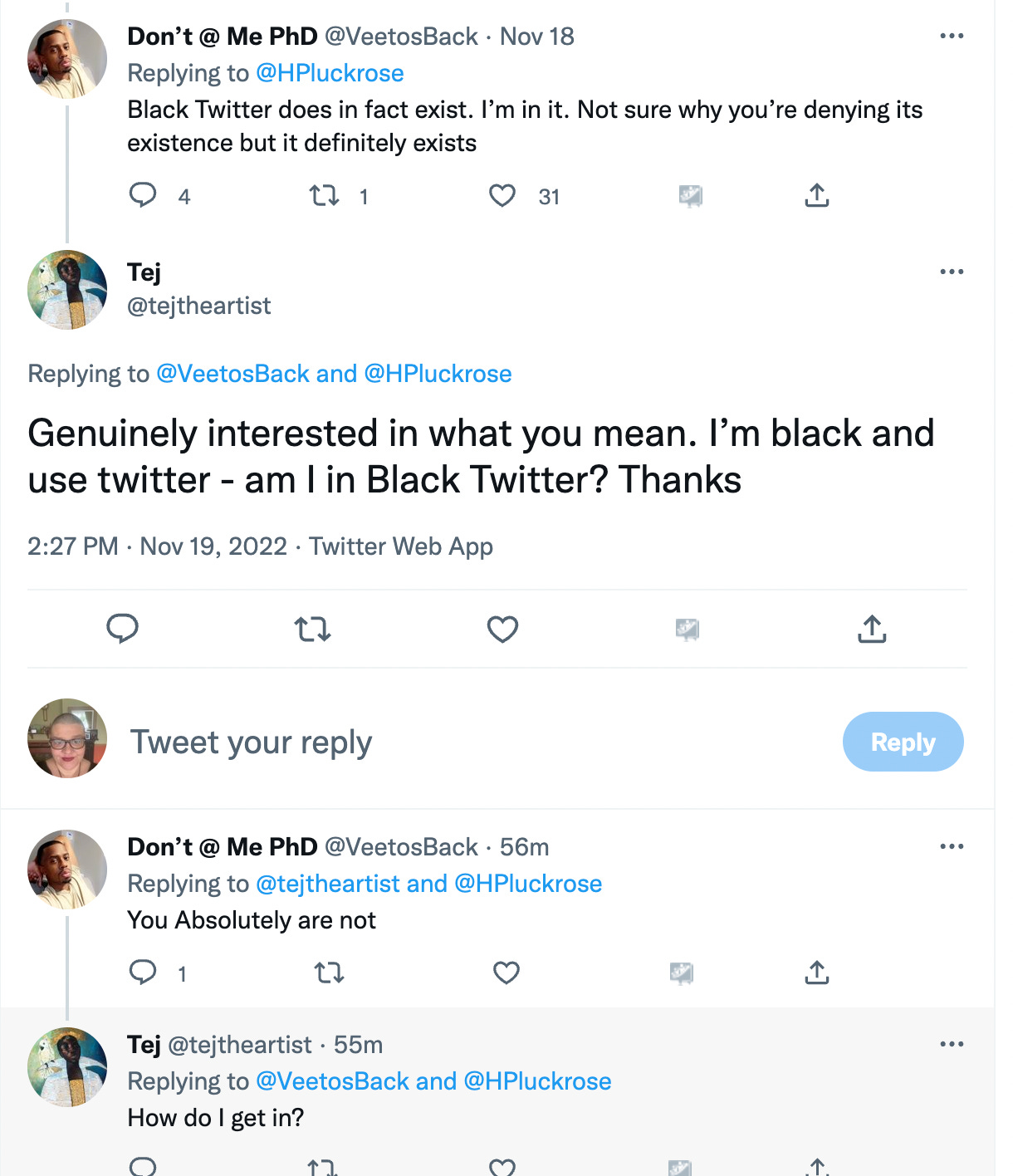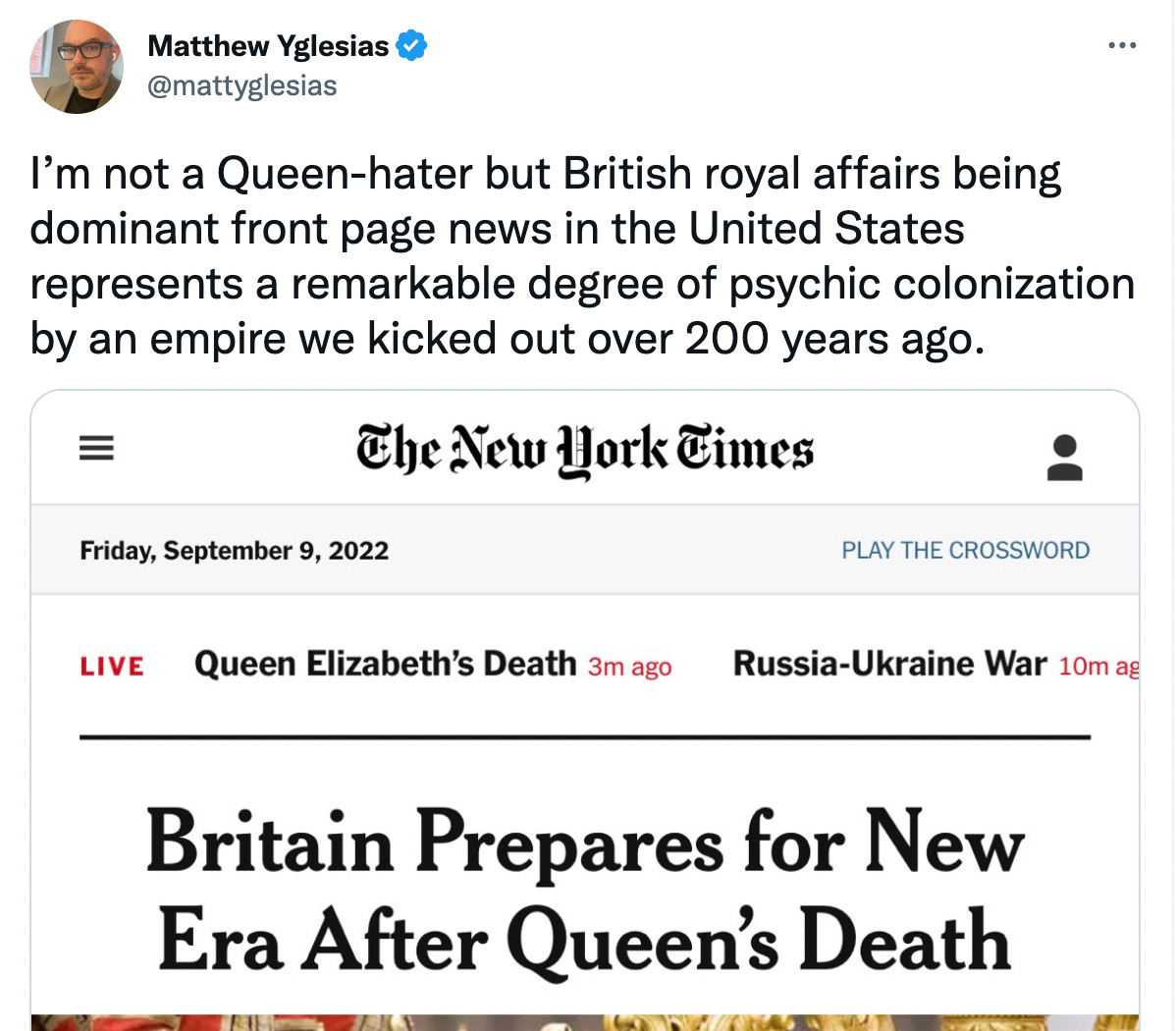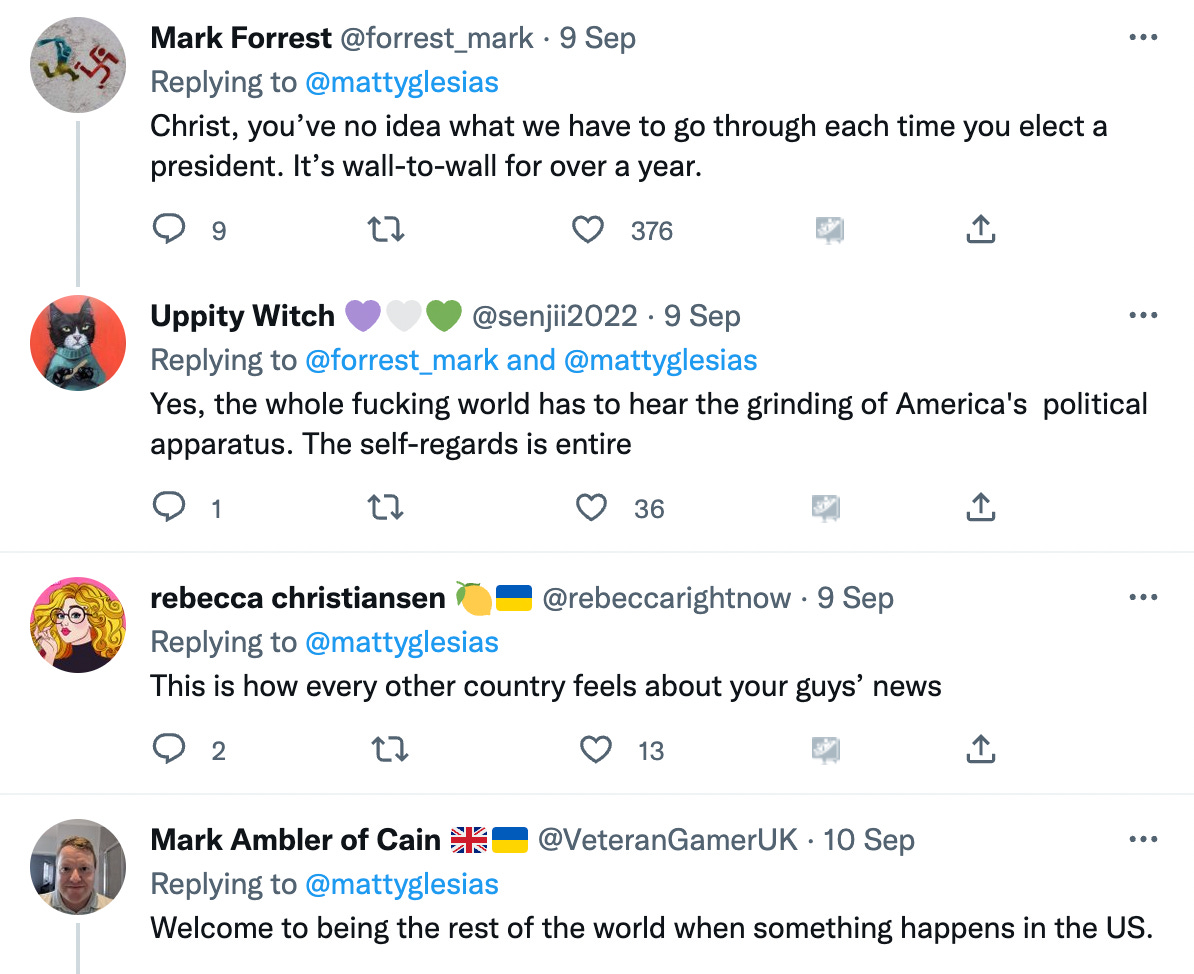
I love America. It is a country I have a special fondness for and one which has produced not only half of my most admired thinkers but several of the people I love most in the world. I love to visit America and interact with Americans. It really does have a national character and it is a very endearing one. For the most part, in comparison to England, and particularly London, it is a warm, welcoming & genuine character. As a Brit wandering around various parts of it, it took some time for me to get used to the openness and directness of Americans. I am just not used to people looking at me directly, speaking to me, smiling at me, saying exactly what they mean and becoming puzzled when I automatically apologise to them for doing things like standing next to them at a supermarket shelf.
For any Brit who has not yet visited America, I recommend packing a travel kettle with American plug as you cannot expect hotel rooms to have tea-making facilities. Keep tea bags on your person at all times and just ask for a cup, a jug of boiling water and a glass of “2% milk” in cafes as this is so much easier than trying to explain what you mean by “tea.” Get used to substituting ‘warder’ (as in ‘prison warder’) for ‘water’ if you want anyone to know what you’re talking about and avoid asking for directions to the ‘loo.’ Also, try not to say ‘tomato’ in any restaurant as this almost guarantees that everyone within hearing distance will delightedly repeat your pronunciation several times and your sandwich will inevitably be delayed. Make sure you ask for a “pharmacy” rather than a “chemist” unless you want people to think you are seeking a laboratory or a drug dealer and avoid using the term “faffing” as, apparently, this term for dithering about does not exist in the US but does sound like another term that refers to masturbation.
More advanced rules for visiting America include training yourself into speaking very literally and not assuming that Americans will know that ‘not bad’ means ‘good’ and ‘quite good’ means ‘disappointing.’ Also, know that being asked all sorts of personal questions like your name, profession and marital status is just part of general conversation as is being told that someone else is going through a difficult time. A natural curiosity about other people and admission of experiencing emotions is perfectly normal on the other side of the Atlantic. In a worst case scenario, where an inhabitant of the New World is just staring at you with a baffled expression, you can usually just explain that you are British and whatever weirdness you have just unknowingly committed will be accepted as charming rather than alarming. When it comes to Anglo-American relations, I have been forced to accept that it is actually we who are weird and confusing while Americans are, on the whole, perfectly open and straightforward and mean precisely what they say. Americans are, therefore, among my favourite people and visiting the US one of my favourite things to do.
Encountering Americans on social media, however, can be quite a different experience. This is particularly the case when it comes to the peculiarly American phenomenon of “forgetting that the rest of the world exists” and assuming that everyone online is American unless proven otherwise. (Sometimes even proving oneself to be a citizen of an entirely different country isn’t deemed a good enough reason to speak outside an American context).
This phenomenon hit me again yesterday when I denied the existence of a single “black Twitter” in response to someone comparing its output to that of Neo-Nazis. My point was, of course, that there are many Twitter networks which are comprised mostly of people considered black and addressing issues of concern or interest to that particular network that relate to some aspect of being black within a certain cultural milieu. The vast majority of them in no way resemble Neo-Nazis but instead include black humanist organisations, black churches, black beauty and fashion tweeters, aficionados of various forms of music that originated in black communities as well as many intellectual, artistic and political organisations. These range from the American organisation Free Black Thought which exists to platform the wide diversity of black intellectual thought to the UK organisation TuWezeshe Akina Dada which supports young African women at risk of violence to The Equiano Project which celebrates that historical anti-racist pioneer and opposes racial essentialism to organisations worldwide and all over the African continent addressing everything from art and history to human rights and health. All of these form networks on Twitter and none of them own the title of “black Twitter” which is essentialising and exclusionary of everybody else.
I did not believe it would be controversial to anybody except what must surely be a tiny number of black Neo-Nazis to deny that a single black Twitter existed and was indistinguishable from Neo-Nazism. However, it was. I was informed, in no uncertain terms, that a Black Twitter absolutely exists and furthermore is American and dedicated to critical theories of race. Many black Americans who told me this, including the original tweeter were critical of it, but one of the people who informed me of this was the American journalist, Nikole Hannah-Jones, most known for her creation of the 1619 project. Presumably, she did not agree that it was a Neo-Nazi organisation but simply objected to my denial that what we could reasonably call “Black, American Critical Theories of Race Twitter” is the one authentic ‘Black Twitter.”
This is just one of the examples of some Americans appearing to forget that the rest of the world exists or acting as if the rest of the world is irrelevant. It is simply astounding that members of a single Twitter network can insist upon itself being the “Black Twitter” when it is confined to a single country that contains less than 4% of the world’s black people. Upon questioning this, a fellow Brit was informed that he could absolutely not be part of black Twitter.
To be fair to the original tweeter who, among many others, responded to me politely and in good faith, it must be noted that they were speaking in a specific context. We simply cannot contextualise every tweet that we make and it is reasonable for people to expect those who see their tweets to know the context in which they write and to what they are referring. I myself often tweet in a British context and in reference to previous writing without letting everybody know I am doing so and linking my previous writing. Therefore, I conceded to him that I could be being pedantic and annoying if taking him out of context.
Nevertheless, even in the US, there are many who object to any ideological group being understood to represent black Americans and this is a fairly foundational principle among all those who oppose racial essentialism. It is generally understood that assigning any moral or social significance to anybody’s skin colour is racist and likening ‘black Twitter’ to Nazism has a fairly strong moral and social significance.
The issues of race and racism coming out of America are of significance to everybody as they are being imported around the world at quite an alarming rate and theories developed in an American context are being implemented in other countries where they simply don’t fit. Here, in the UK, I have been shown a number of policies and training programmes that refer to the oppression of “BIPOC” (Black, Indigenous and People of Color) people. Who are the oppressed indigenous people of Britain? The Celts? The UK has a deeply racially oppressive history but it is not the same as that in America. Similarly, a German teacher showed me an anti-racist training programme provided by an American company at his school which insisted that all Germans had internalised the racism of the Jim Crow era. He included his own letter informing the trainer that most Germans do not know what “Jim Crow” was and were confused by the term and suggesting that he research the history of the country in which he was training people. Astonishingly, the programme for Germans included absolutely no mention of antisemitism.
Although the issue of American critical theories of race and concepts of blackness being assumed to be universally applicable on social media is a particularly worrying aspect of the problem, it also applies more broadly. While very many Americans engage with Twitter in the full knowledge that it is an international platform and that less than 20% of people who use it are American and engage with it accordingly, very many do not. In particular, there is a frequent assumption that anybody speaking in English is American, much to the annoyance of Brits, Canadian, Australians, the Irish, New Zealanders and anybody from anywhere who tweets in English as a second language. This is a natural result, I believe, of a wider phenomenon where the sheer size of the country and its powerful status on the global stage as well as its prominence in music and film can lead its inhabitants to become much more own-country-centric than is possible for much of the rest of the world.
This was exemplified by this tweet by Matthew Yglesias, much of whose work I admire, and the responses to it.
While the rest of the world, and particularly the Anglosphere, simply cannot forget that America exists or fail to know major events happening inside it, it appears to be much easier for Americans to forget the rest of the world. Twitter is certainly not a good example of the attitudes of all people, but it is where we get to engage with each other. I would strongly encourage any Americans who think they might be falling prey to this to make a deliberate effort to follow more people from more countries and gain a wider perspective of the whole range of worldviews that exist beyond their own borders.
I, myself, often tweet in a British context and I have no problem at all with Americans bouncing off my points about British politics and current events and relating them to those in the US. This is perfectly valid and interesting and I often do the same and reapply a point to my own context. What is somewhat annoying, however, is when I am speaking in such a context and am told I am simply wrong because of a different situation in America.
This most often happens when I am speaking of freedom of speech and a dozen people or more will tell me that I do not understand the First Amendment. Very occasionally, when I address issues of free speech, I may be referring to one amendment to one constitution of one country in which I do not live, but most often I am not. Most often I am referring to a foundational principle of philosophical liberalism that transcends international boundaries, the development of which my own country can be considered to have contributed to somewhat. Quite frequently, I fail to convey this no matter how much I may point the individual insisting that the entirety of the issue around free speech is covered by the US constitution at a guy named John Stuart Mill.
Of course, very many Americans are philosophical liberals and do not need these principles or the fact that they were not American inventions explained to them. One of the most influential liberal philosophers on the subject was Frederick Douglass,
Liberty is meaningless where the right to utter one’s thoughts and opinions has ceased to exist. That, of all rights, is the dread of tyrants. It is the right which they first of all strike down. They know its power. Thrones, dominions, principalities, and powers, founded in injustice and wrong, are sure to tremble, if men are allowed to reason of righteousness, temperance, and of a judgment to come in their presence. Slavery cannot tolerate free speech. Five years of its exercise would banish the auction block and break every chain in the South.
Frederick Douglass "Plea for Freedom of Speech in Boston" (1860)
and the most masterly contemporary explanation of liberal principles remains Kindly Inquisitors, by the American writer, Jonathan Rauch.
The Fundamentalist Principle: Those who know the truth should decide who is right.
The Simple Egalitarian Principle: All sincere persons’ beliefs have equal claims to respect.
The Radical Egalitarian Principle: Like the simple egalitarian principle, but the beliefs of persons in historically oppressed classes or groups get special consideration.
The Humanitarian Principle: Any of the above, but with the condition that the first priority be to cause no hurt.
The Liberal Principle: Checking of each by each through public criticism is the only legitimate way to decide who is right.
The argument of this book is that the last principle is the only one which is acceptable, but that it is now losing ground to the others, and that this development is extremely dangerous.
Jonathan Rauch. Kindly Inquisitors. (1993)
Nevertheless, I cannot help but notice that increasing numbers of less thoughtful Americans online are reducing all issues and all people to within their own borders. Whether it is the idea that ‘black Twitter’ is confined to a certain ideological sect among the 4% of black people who are American or that all we need to know about freedom of speech is confined within its constitution, I cannot feel that this will, in any way, help America overcome its polarisation problems or expand its horizons. Becoming further locked inside one’s own borders only locks down one’s mind and we really need open and expansive minds right now. We need it in the UK where we too are in danger of becoming more insular (and not just literally) and we need it in the US.
America, I repeat, I love you dearly. You have contributed so much to the world, produced many great innovations and many of the world’s most important thinkers, scientists and artists. You, like most great nations, have done great harm and great good and from that produced pioneers for civil rights and made great strides in human rights and human liberty. You have also given me many of my best friends and shown the world that there is almost nothing that cannot be improved with the addition of peanut butter, bacon or both.
But please, for the love of all that is good, work on reminding yourselves and your fellow citizens that the rest of the world exists.






Alright, duly noted. So you're from the UK? You folks have a great ball team! But regarding tea, why in the world would you add milk to it? All you have to do is buy a cold bottle, flip the cap and enjoy the fizzy sweetness. Tea originated in Arizona and you'all in Kentucky probably don't like it...
I think it would be helpful to frame wokeness as a deeply un-cool "Americanization". This would probably make a lot of people in the UK want to run a thousand miles in the opposite direction.
For what it's worth, American solipsism bothers me because it has a tendency to export the worst parts of our culture to the rest of the world. There was a time when I could dream of visiting Europe and having a temporary escape from American racial neurosis. That is beginning to look less and less likely. American soft power slowly makes the rest of the world resemble us in our worst aspects.